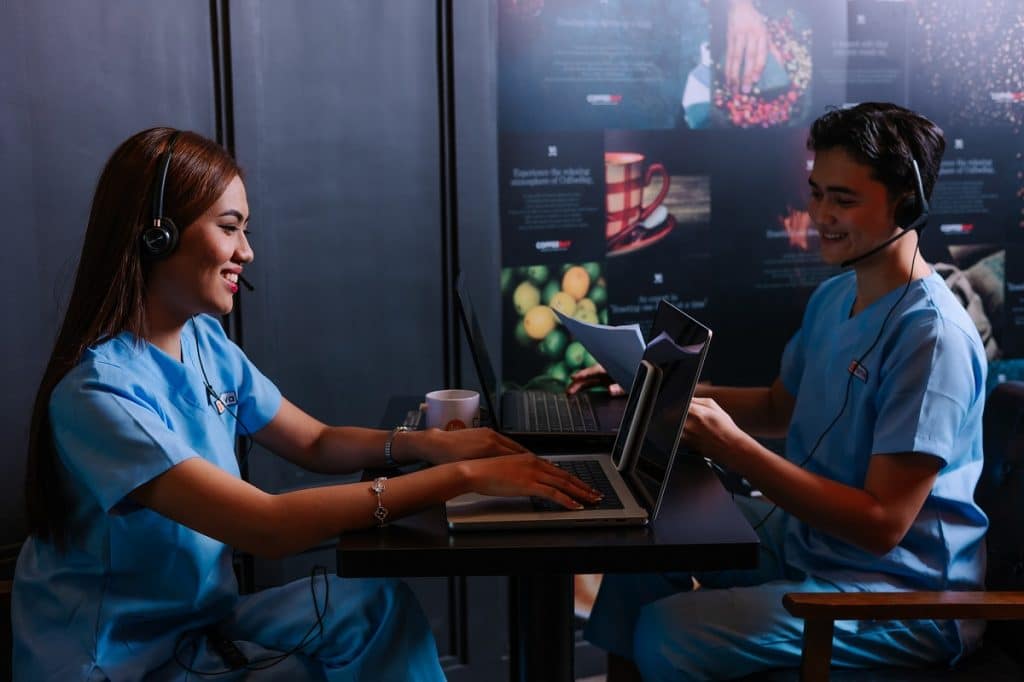Emergency Room Scribe: A Career in Emergency Department Medicine
Curious about what is an er scribe? Discover how they streamline care and let physicians focus on patients—learn more today!
How Can Prior Authorization Remote Help Your Practice?
See how Portiva is making a real difference in medical practices through our clients’ experiences. Watch this short video to see the impact for yourself, and let’s talk about how we can help streamline your operations and improve patient care today!
Table of Contents
Emergency Room Scribes are indispensable members of the healthcare team, playing a crucial role in the fast-paced environment of the emergency department (ED). Acting as the physician’s right hand, they handle the vital task of real-time documentation, ensuring that providers can focus more on patient care. This article explores the multifaceted aspects of being an emergency room scribe, outlining responsibilities, required training, challenges, and the overall impact scribes have on efficiency, patient care, and the future of emergency medicine.
What is a Scribe in the Emergency Department(ED)?
A medical scribe, often referred to as an emergency room scribe, is a trained professional who assists physicians and providers by documenting patient encounters as they happen. The scribe becomes the physician’s shadow, following them throughout the ED and carefully recording critical details such as medical histories, examination findings, diagnostic test results, and treatment plans.
This real-time documentation supports physicians in maintaining accurate patient records while reducing the burden of paperwork. By handling charting duties, scribes give physicians the freedom to devote more time and attention to direct patient care.
Key Responsibilities of Emergency Room Scribes
The primary responsibility of an emergency room scribe is documentation, but the role extends into several related tasks, including:
- Maintaining accurate electronic medical records (EMR) or electronic health records (EHR).
- Recording patient histories, physical exam results, lab reports, and radiology findings.
- Updating charts with treatment courses, procedures, and consultations.
By managing these tasks, scribes become essential contributors to the workflow and efficiency of the emergency department.
The Importance of Scribes in Patient Care
Scribes positively influence both providers and patients. They allow physicians to dedicate more time to meaningful patient interactions, which enhances patient satisfaction. By reducing administrative burdens, they also help lower physician stress levels and combat burnout—a growing concern in emergency meds.
Another crucial impact is on department flow. With scribes ensuring timely and accurate documentation, patients often experience shorter wait times and smoother transitions through their care process. This efficiency benefits patients, providers, and the hospital system as a whole.
Impact of Scribes on ED Efficiency & Physician Productivity
No Data Found
Physician productivity increased from 1.13 to 1.31 patients per hour per doctor—a 15.9 % boost. Primary consultations rose from 0.83 to 1.04 patients per hour—a 25.6 % increase. Median patient length of stay (LOS) dropped by 19 minutes, from 192 to 173 minutes (P < 0.001)
Impact of Scribes on ED Efficiency & Physician Productivity
No Data Found
Physician productivity increased from 1.13 to 1.31 patients per hour per doctor—a 15.9 % boost. Primary consultations rose from 0.83 to 1.04 patients per hour—a 25.6 % increase. Median patient length of stay (LOS) dropped by 19 minutes, from 192 to 173 minutes (P < 0.001)
Training and Qualifications for Emergency Room Scribes
Phones may be a medical receptionist’s busiest channel, with tasks such as answering phone calls, responding to patient inquiries, and managing unexpected situations like cancellations or rescheduling.
Educational Background Required
Most scribe positions require at least a high school diploma, but employers often prefer candidates with some college coursework in healthcare-related fields. Knowledge of medical terminology, anatomy, and physiology provides a strong foundation for success.
Many aspiring medical professionals—including pre-med, pre-PA, and nursing students—pursue scribe roles for hands-on exposure to clinical settings. This often strengthens applications to medical schools and provides valuable insights into the realities of patient care.
Certification and Training Programs
While not universally required, certification and training programs can enhance a candidate’s prospects. Many organizations provide comprehensive training that covers documentation techniques, EMR systems, medical terminology, and emergency department procedures. Some programs include simulations and supervised practice to prepare scribes for the fast-paced ED environment.
Completing such training demonstrates both competence and commitment, making certified scribes more competitive in the job market.
Essential Skills for Success as a Scribe
To thrive as an emergency room scribe, professionals must develop:
- Exceptional attention to detail.
- Strong verbal and written communication skills.
- The ability to stay focused in high-pressure situations.
Scribes must balance accuracy with speed, ensuring medical records are both complete and reliable. Time management and adaptability are also vital for managing the constant changes and urgent demands of emergency meds.
What Our Clients Say About Us!
Discover how our dedicated clients have achieved their goals and transformed their businesses with our expert solutions. Join the ranks of satisfied customers and experience the difference for yourself.
Boost your Efficiency with
Portiva's Virtual Medical Assistant Services
Portiva’s Virtual Medical Assistant Services help healthcare providers streamline administrative tasks, improve efficiency, and enhance patient care all while reducing workload and costs.
Medical Assistant
Insurance Verification
Medical Receptionist
Prior Authorization
Medical Scribe
Dental Assistant
Medical Transcription
Executive Assistant
Medical Billing
Medical Billing
The Benefits of Being an Emergency Room Scribe
Career Advancement Opportunities
Serving as an ER scribe is often a stepping stone to advanced healthcare careers. Pre-medical and pre-nursing students gain firsthand patient care, medical terminology, and physician decision-making. Many former scribes credit their experience with improving their applications to medical, PA, and nursing schools, as well as preparing them for the demands of professional practice.
Impact on Emergency Medicine Practice
The influence of scribes extends beyond individual career paths. By streamlining documentation, scribes allow emergency departments to function more efficiently. This efficiency leads to reduced patient wait times, higher satisfaction scores, and improved staff morale. Studies show that scribes also help decrease physician burnout, which supports long-term retention of professional providers.
Personal Development and Learning Experience
The role also fosters personal growth. Scribes develop resilience under pressure, refine their communication skills, and gain confidence in medical settings. Exposure to real-life cases strengthens critical thinking and adaptability—qualities that benefit both future medical professionals and those who choose to remain in scribe-related careers.
Challenges Faced by Emergency Room Scribes
High-Pressure Environment of the ED
The ED is unpredictable and often chaotic. Scribes regularly witness trauma, critical illnesses, and emotionally charged situations. Remaining calm and precise in this environment requires focus, resilience, and adaptability.
Maintaining Accuracy Under Stress
Accuracy is paramount. Mistakes in documentation can affect patient care and medical decision-making. Scribes must maintain concentration even in fast-paced, high-stress circumstances. Ongoing training and feedback help maintain standards and improve performance.
Balancing Workload and Job Satisfaction
The demands of long shifts, nights, and weekends can be taxing. Without proper balance, scribes may experience fatigue or burnout. Finding strategies to manage workload—such as setting boundaries and prioritizing wellness—is essential for maintaining job satisfaction.

Future of the Scribe Profession in Emergency Medicine
Trends in Emergency Department Staffing
With rising patient volumes and physician shortages, the demand for scribes is expected to increase. Hospitals recognize the cost-saving and efficiency benefits of employing scribes, which translates to broader job opportunities and long-term growth in the profession.
Technological Advances and Their Impact
Emerging tools like voice recognition and automated charting may transform medical documentation. However, these technologies still require human oversight. Skilled scribes will remain essential to ensure accuracy, manage complex cases, and support physicians in real time.
Long-term Career Prospects for Scribes
For those who pursue healthcare careers, scribing provides a foundation of knowledge and experience that is difficult to match. For others, the profession itself may offer pathways for advancement, specialization, or leadership roles within healthcare organizations. In both cases, long-term prospects remain strong.
Conclusion
Emergency room scribes play an essential role in modern emergency meds. By shouldering the burden of documentation, they allow physicians to focus more fully on patient care, which leads to better outcomes for both patients and providers. The position offers significant benefits, from career growth opportunities to personal development, while also presenting challenges that test resilience and adaptability.
As healthcare evolves and emergency departments face increasing demands, the value of scribes will only continue to grow. For aspiring healthcare professionals, becoming an emergency room scribe provides not just a job, but a meaningful stepping stone into a career in medicine.
Take Action Now!
- Are your medical receptionists trained for 2025 and beyond?
- Want to reduce front‑desk errors and delays?
- Looking to boost patient satisfaction scores?
Contact us now at portiva.com for a free strategy session and discover how we can help your medical receptionist team excel.



